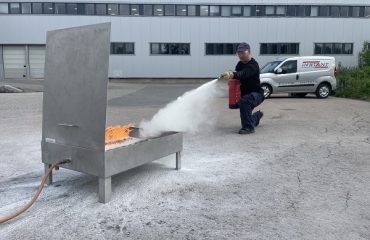
As a contribution to increased HSE focus in the construction industry, we are reducing the prices of two of our popular online courses. Courses in lifting, strapping and signalling, as well as courses in dangerous hand tools have been given new prices. The new prices apply to all languages.
New prices are as follows:
Lifting and strapping course – 1,990,-
Dangerous hand tools – safety course – 990,-
Briefly about the courses:
Course in lifting equipment, slinging and strapping :

Our online lifting equipment course provides documented training in accordance with the Regulations on Organisation, Management and Participation, the Internal Control Regulations, the Regulations on the Execution of Work, the Machinery Regulations , the Building Regulations and the Workplace Regulations. An anchor/strap course is intended for personnel working in areas where lifting operations are part of the job. Anchors and slings ensure that crane and sling operations are carried out in a safe manner. This course covers the regulatory requirements for training.
Dangerous hand tools – safety course :

Safety course in the use of dangerous hand tools satisfies the requirements for documented training in accordance with the Regulations on the performance of work §10-2, Regulations on organisation, management and participation, and the Internal Control Regulations . The course provides a basic introduction to the safe use of hazardous small tools such as: angle grinders, cut-off saws, bolt guns and nail guns.
The importance of training in your own language:
A lack of communication in the construction industry can also pose a significant safety risk. Especially when there are many foreign workers and companies involved. Workers from different countries may not be fluent in each other’s languages or familiar with each other’s cultures. This makes it particularly important that safety training is given in a language the employees understand. Instant Norway has focused on language challenges in the industry and therefore offers most online course modules in several languages such as Norwegian, English, Polish, Lithuanian and Estonian. The regulations have no direct requirements for Norwegian language skills, but training must be provided in a language the recipient understands. This means that many course participants who need important training can receive it in their mother tongue.




